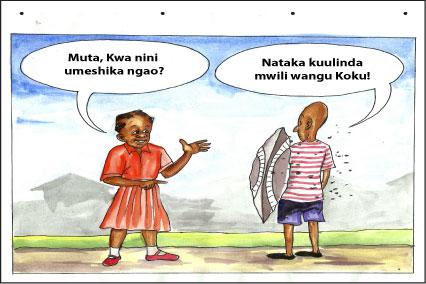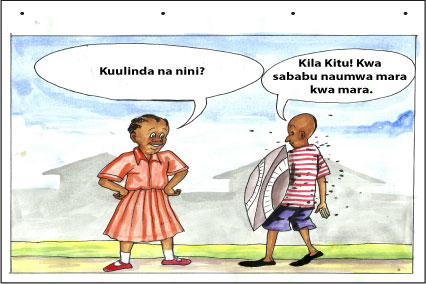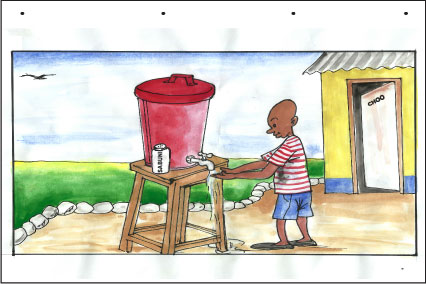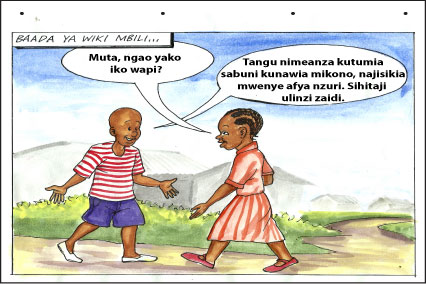Body Shields as Disease Protectors: Formative Research in Tanzania

Educational materials telling the story of Koku and Muta. Koku (left): "Muta why are you holding the shield?" Muta: " I want to protect my body Koku".
Kenneth Makata, Research Coordinator at MITU shares his reflections on conducting formative research in schools in Tanzania.
As part of the Mikono Safi formative research, we have been working in three primary schools of Bukoba municipality, northwestern Tanzania, to try to learn about the emotional and motivational drivers for behaviour change towards handwashing with soap after key events among school children. We implemented this formative study to pilot motivational messaging, which will later be used as one of intervention components of the main trial. Through a series of in-depth interviews with children, we found three main motivational drivers for behaviour change; fear, disgust and nurture. Children described fear of getting infected with diseases, having dirty hands or failing to achieve their goals as drivers for behaviour change towards handwashing with soap after using the toilet.
Motivational messaging
Based on these findings, we developed educational materials targeting these identified drivers of behaviour change. The materials used contained a range of messages on handwashing steps, transmission patterns of intestinal worms, and an engagingstory of two children (Koku and Muta) having a conversion on better ways to stay safe from diseases. In addition to the known drivers of behaviour change, the story of the two kids triggered another motivational driver, humour, despite of the fact that we did not originally intend it to be funny! Instead, we designed the story to portray and envoke fear, disgust/body autonomy, play and social norms.
Koku and Muta story
This story used the locally derived names of Koku and Muta which are very common in Bukoba. Muta is a boy who attempts to protect himself from diseases (‘invaders’) by using a shield.
Koku: " Protect your body from what?". Muta: "From everything, because I keep getting sick every time"
The story was usually acted by two children playing the roles of these characters and read out the captioned conversation. Most of children who played the boy’s role used silly voices or gestures - something which triggered laughter among the other children. Children also found the idea of Muta holding a shield to protect himself from getting sick funny, and often burst in laugher when they saw the page showing Muta holding a shield and telling Koku “I want to protect my body, I keep getting sick”.
Koku, a smart girl, explains to Muta that he just needs to wash his hands with soap after every time he uses the toilet and before eating. Taking up Koku’s advice, later Muta is shown without shield and seems happy and healthier.
Muta is seen taking Koku's advice by washing his hands with soap and water after using the toilet.
Several months after we introduced the story to the children, they still remembered the content and specific messages, even though no booster health education sessions had happened.
Koku: "Muta where is your shield?" Muta: "Since I started using soap to wash my hands, I feel fine, I don't need any other protection"
Some of the children were even quoted teasing each other by calling one another Muta if one did not washed his/her hands after visiting the toilet. Others mentioned that they didn’t want to be silly like Muta by not washing hands with soap after using the toilet.
In this particular case, the fact that the children found the story funny brought about a lasting learning effect. Personally, I think this has been an unintentional benefit of the formative work, and we will encourage use of funny and entertaining components of the story during the main trial.



